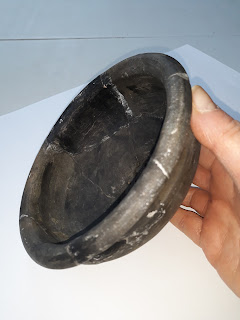Everyday vessels like this take us straight to the kitchen or hearth of a Romano-British family home, to people preparing their food and maybe adopting some new food fashions and items of kitchen equipment after Britain became part of the Roman Empire. One manual of Roman cooking survives– the recipes of Apicius, a celebrated Roman ‘celebrity chef’. However his recipes do not necessarily reflect what the average Roman Briton was cooking – especially those with more exotic ingredients such as ostrich! Nevertheless it does give us a valuable insight into Roman cuisine, and some ways of preparing common foodstuffs and sauces. Recipes for preparing cooked squashes in sauce or lentils with chestnuts, for instance, refer to straining ingredients.
Small Roman flagon and cup, both dating from the mid 2nd century AD
This flagon was made at a pottery near St Albans (Roman Verulamium) and the cup was imported from north Gaul (Roman France). The flagon was found in Great Chesterford and given to the Museum in 1836 – the year after it opened – by a Mrs Barnes. The little cup, which is just 7cms high, may also have been found at Great Chesterford, but no record survives of its provenance.
Wine was imported and enjoyed before the Roman conquest by at least some local Iron Age people; wine amphorae (large pottery containers) have been found in high-status burials and sherds of amphorae were excavated at an Iron Age village site now under Stansted Airport. Romans usually drank wine diluted with water – even soldiers had a ration of weak, sour wine. After the Roman conquest the taste for wine and its availability spread. Drinks based on wines flavoured with herbs and spices were also popular, as was the use of wine in cooking. Native drinks were based on fermenting grains (barley, wheat) and honey, so mead was probably common as well as beer, though strictly it would have been more like an ale or barley wine as hops were not used in Britain until the late Middle Ages.
The small size of the flagon and cup suggest they might have ben used for someone’s special tipple rather than drinking to quench thirst. Perhaps we could imagine a local Briton enjoying a nip of spiced wine on a damp chilly evening? Bibite! (Drink up!)


Comments
Post a Comment